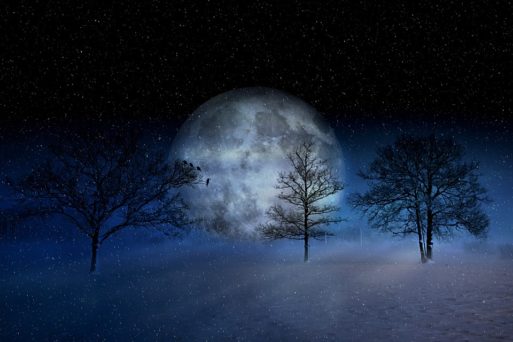
Confronting grief and loss in the wreckage of the moon
Cold despair slapped my psyche the first time I read the poem, “Having Lost My Sons I Confront the Wreckage of the Moon: Christmas, 1960” by James Arlington Wright. Haunted by the icy imagery and the brutal sadness the poem conveys, I had to take a deep breath, struck dumb by this poem of loss and loneliness.
After dark
Near the South Dakota border,
The moon is out hunting, everywhere,
Delivering fire,
And walking down hallways
Of a diamond.
Behind a tree,
It lights on the ruins
Of a white city
Frost, frost.
Where are they gone
Who lived there?
Bundled away under wings
And dark faces.
I am sick
Of it, and I go on
Living, alone, alone,
Past the charred silos, past the hidden graves
Of Chippewas and Norwegians.
This cold winter
Moon spills the inhuman fire
Of jewels
Into my hands.
Dead riches, dead hands, the moon
Darkens,
And I am lost in the beautiful white ruins
Of America.
What forces caused Wright to be so dismal — “dead riches, dead hands. . .” — and yet write in such beautiful imagery, “the moon spilling the inhuman fire / of jewels / into my hands”?
James Wright and His Troubled Genius
James Wright, the author of the poem, struggled throughout his lifetime. He had a nervous breakdown before he graduated from high school, causing him to graduate a year late. He then enlisted in the Army and served in Japan during the American occupation. Wright’s intellect triumphed over his mental demons. He went on to graduate cum laude and Phi Beta Kappa from Kenyon College, a small liberal arts college in Ohio. Eventually, he earned Master’s and Doctorate degrees from the University of Washington and studied both in the United States and Austria under well-known poets, including Theodore Roethke.
The intensity of emotion and vividness of setting in this poem that rocked me is exactly what earned Wright the Yale Younger Poets Prize in 1957 with the publication of his first book, “The Green Wall.” His work “The Branch that Will Not Break” confirmed him as a force in American poetry. His “Collected Poems” in 1971 won a Pulitzer Prize.
Despite his success, Wright struggled with alcoholism all his life, finally overcoming it with the help of Alcoholics Anonymous when he was in his forties.
“Having Lost My Sons, I Confront the Wreckage of the Moon: Christmas, 1960”
“Having Lost My Sons, I Confront the Wreckage of the Moon, Christmas 1960,” was written about Wright’s devastation in being estranged from his two sons, Marshall and Franz, after his first marriage failed.
The suggestion of a frozen cemetery is a powerful one. “[The moon] lights on the ruins “of a white city / Frost, frost. / Where are they gone / Who lived there? / Bundled away under wings / And dark faces.”
Wright’s loss feels like death, the separation from his sons leaving the poet bewildered and alone.
It’s important to note that this poem includes in the title, “Christmas, 1960.” The holidays are hard for those who grieve.
It’s also important to note that this poem ends with a recognition of beauty, however hard and brittle it may be. “…The beautiful white ruins / Of America.”
Father and Son
The impetus for this poem was Wright’s alienation of his sons. However, his second son, Franz, later reconciled with his father. James Wright served as a mentor to Franz. In 2004, Franz Wright won a Pulitzer Prize for poetry, making James and Franz Wright the only father and son to each win the famed Pulitzer Prize for poetry.
As Julia Keller says in a Chicago Tribune article entitled Pulitzer winner in father’s shadow but casting his own light, “A family’s private anguish thus becomes, through the courage and generosity and talent of a father and a son, a way to look at all families, at their tangled histories, and at how a bright thread of hope can run through the darkest material.”
Wright died at the age of 52 of cancer of the tongue.

 “Having Lost My Sons, I Confront the Wreckage of the Moon: Christmas, 1960” by James Arlington Wright
“Having Lost My Sons, I Confront the Wreckage of the Moon: Christmas, 1960” by James Arlington Wright


 “In Case You Don’t Live Forever” by Ben Platt
“In Case You Don’t Live Forever” by Ben Platt
 Our Monthly Tip: Make an “In Case of Death” File to Ease Loved One’s Grief
Our Monthly Tip: Make an “In Case of Death” File to Ease Loved One’s Grief
 Passing of Beloved Comedian Births a New Comedy Festival
Passing of Beloved Comedian Births a New Comedy Festival














